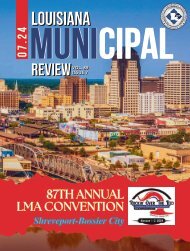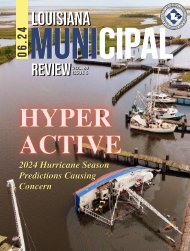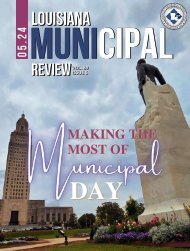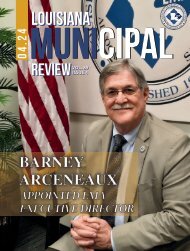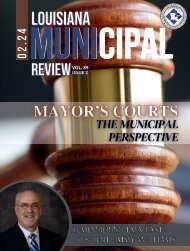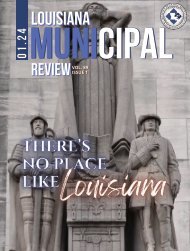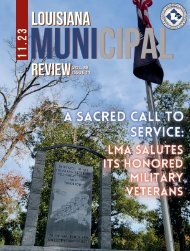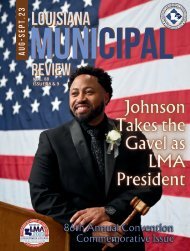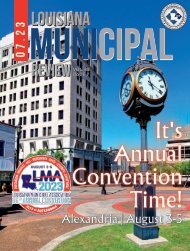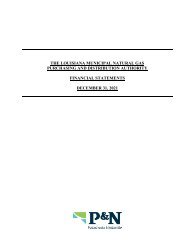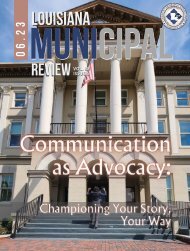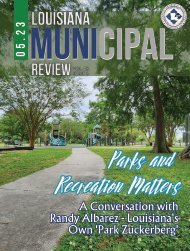December 2023
You also want an ePaper? Increase the reach of your titles
YUMPU automatically turns print PDFs into web optimized ePapers that Google loves.
LEGAL BRIEFS<br />
Capital Confusion<br />
The <strong>2023</strong> Regular Session birthed two<br />
new laws that fundamentally change the<br />
methods by which municipalities access<br />
capital outlay funding from state coffers.<br />
Unfortunately, there are elements of uncertainty<br />
surrounding each provision.<br />
To start, Louisiana has a new Governor-Elect,<br />
who just appointed a new<br />
Commissioner of Administration. So, the<br />
current approaches and interpretations<br />
of the Division of Administration – which<br />
processes capital outlay applications and<br />
prepares the state’s annual construction<br />
budget – may not be those of future DOA<br />
administrators.<br />
Act 82 makes various streamlining<br />
changes to internal and external capital<br />
outlay processes. The most profound of<br />
those creates a new application mandate<br />
for non-state entities regarding new<br />
construction projects funded by capital<br />
outlay. The requirement means that<br />
municipalities applying for capital outlay<br />
funding for new projects must provide<br />
documentation evidencing their ability to<br />
provide funding in the amount of at least<br />
3% of the total requested funding for the<br />
long-term maintenance of the project.<br />
Essentially, the municipality must have a<br />
sensible plan to ensure that new projects<br />
are properly maintained for the long haul.<br />
The confusion arises regarding the effective<br />
date of this change. Under the clear<br />
wording of the act, this proof mandate<br />
applies to “the funding of all projects included<br />
in the capital outlay budget for<br />
fiscal years commencing ON OR AFTER<br />
July 1, 2024.” That indicates that current<br />
capital outlay applications (submitted by<br />
November 1, <strong>2023</strong>) would have to comply<br />
with this provision since those projects<br />
would be funded in FY24. However,<br />
current DOA leaders are interpreting the<br />
change to apply only to capital outlay applications<br />
submitted starting in 2024 and<br />
funded starting in 2025 (i.e., not applications<br />
submitted in <strong>2023</strong>).<br />
Further complicating matters, the online<br />
portal for submitting capital outlay applications<br />
(eCORTS) has no option or field for<br />
municipalities to provide their statement<br />
of proof of funding. It is suggested that<br />
municipal members immediately prepare<br />
articulations of their maintenance funding<br />
plans to be submitted with all future<br />
applications and to be provided upon<br />
request from DOA regarding pending applications.<br />
While municipalities should consult with<br />
their attorneys to perfect such statements,<br />
here is some suggested language<br />
for consideration:<br />
“In accordance with a new requirement that<br />
Act 82 of <strong>2023</strong> added to Capital Outlay Law,<br />
(insert requesting entity name here) is hereby<br />
documenting, through this Capital Outlay<br />
Request document, that (insert requesting<br />
entity name here) has the ability to provide<br />
no less than three percent of the total<br />
requested amount of funding to be used exclusively<br />
for costs associated with the longterm<br />
maintenance of the project. Maintenance<br />
funding in the amount of at least<br />
($________) will be provided through the<br />
following means: ___________________.”<br />
As always, the LMA will work closely with<br />
agency leaders to stay informed of their<br />
intentions and convey pertinent information<br />
as timely as possible.<br />
Act 292, by contrast, seeks to make local<br />
government access to capital outlay less<br />
burdensome. The new law enables the<br />
state to waive the entire local match or a<br />
portion thereof for a project undertaken<br />
by a municipality under 6,000 in population<br />
or a parish with a population under<br />
7,500. The applicant for a match waiver<br />
must demonstrate “its inability to provide<br />
a local match” by submitting their two<br />
most recent annual audits; and if the project<br />
relates to an existing utility system,<br />
they must submit a rate study from within<br />
the past three years.<br />
But this law gives rise to many unanswered<br />
questions. By what criteria will DOA measure<br />
eligibility for the match waiver? What<br />
are the metrics for evaluating the ability<br />
to provide a local match? What degree of<br />
fiscal health are they looking for? Will they<br />
seek a “sweet spot” of applicants who are<br />
generally fiscally responsible, but simply<br />
lack the match for a particular project?<br />
What effect does the waiver request have<br />
on the overall strength and success of the<br />
capital outlay application? Some municipalities<br />
dedicate more than the minimum<br />
match in capital outlay applications to increase<br />
the chances of their approval – is<br />
that still a winning strategy?<br />
Unfortunately, there is currently NO guidance<br />
from the state to provide any answers.<br />
DOA leaders have indicated that<br />
only a few locals have asked for the match<br />
waiver, and until more applicants do so,<br />
they have no impetus to develop a written<br />
framework for evaluation. So, we are<br />
currently experiencing a circular dynamic<br />
where local leaders are hesitant to submit<br />
requests for match waivers until DOA<br />
develops evaluation criteria; and DOA<br />
is reluctant to develop those evaluation<br />
protocols until more locals request match<br />
waivers. For the time being, municipalities<br />
are encouraged to seek advice from<br />
capital outlay professionals to determine<br />
the best approach for a given project. If<br />
and when DOA formulates how it will digest<br />
this new match waiver authority, we<br />
will disseminate that information to LMA<br />
members as quickly as possible using<br />
multiple platforms.<br />
Editor’s Note: the information provided in<br />
this column is not a replacement for consultation<br />
with your own municipal attorney,<br />
and it should not be considered legal advice<br />
for any particular case or situation.<br />
by Karen Day<br />
White<br />
LMA Executive<br />
Counsel<br />
White is a member of the LMA Legislative<br />
Advocacy Team and can be reached at<br />
kwhite@lma.org.<br />
LMR | DECEMBER <strong>2023</strong> Page 21



